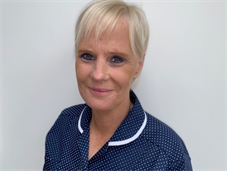One year on: Reflections of working through the pandemic
16 February 2021 - Last year we spoke to nurse Sarah Dheansa about being redeployed to a Covid ward. A year into the pandemic we caught up again

I am no longer working with the team in Guthrie ward but I will always remember those first few weeks of COVID-19 when we were one of first teams at King’s to treat patients who had tested positive for COVID-19. They were challenging and scary days, when PPE was scarce and things were changing on an hour-to-hour basis. Little was known about COVID at that time and the whole team had to work in a very changing environment as the NHS as a whole tried to understand what was going on. It was mentally and physically exhausting for us all.
During the first wave, there was so much fear of the unknown and high levels of anxiety and adrenaline, which kept staff running on near empty. The toughest part was not knowing how long this would be going on and how the clinical picture would develop. During this second wave it feels calmer and staff know what to expect, and we have learnt from the first wave.
However, it is still not easy as we have often had to deal with staff isolating/sickness, rapid increases in patient numbers and deteriorating patients requiring more support. Ward staff have adapted well and do their utmost best to deliver good care. Their clinical skills have improved and they better recognise the priorities of patients when there is so much that needs to be done to deliver good care.
The importance of finding safe ways for families to stay in touch in touch with their loved ones either by virtual methods or by risk assessed visiting has always been important, but Covid has highlighted how essential this is for patients. This, I believe, has been one of the biggest moral dilemmas; assessing the risk of spread of this infection against the segregation of loved ones when patients are critically unwell and at their most vulnerable. We need to be creative and inventive to deal with this problem moving forward.
A defining memory is of Jose, our octogenarian, who spent over five weeks in critical care, ventilated and very sick. Despite all the odds he made it out of critical care onto one of our wards. We found a way to get his daughter in to see and reassure him, which helped orientate him and get him back on the road to full recovery. Jose stays in contact with the team. Watching him with his family and grandchildren reminds us all that there is always hope, despite how sick you become, and that all of our patients are part of something much bigger than we can help restore. He is an inspirational figure for the families who still have a loved one unwell and reminds us of how despite the odds, so many patients have the ability to pull through.
I also learned the importance of looking after yourself and your team’s wellbeing, as well as ensuring we are kind, patient, and looking out for each other. When anyone is tired or stressed we need to make sure we give them space and provide them with support so they can rest and recuperate.
I think it is also important to recognise that a lot of staff have personally lost loved ones to Covid. This makes it incredibly difficult for them when they come to work and care for others whilst they themselves are grieving.
The last 12 months both personally and professionally have probably been the most challenging, extraordinary, and difficult time I have ever had to experience. However, I have learned so much especially with regards to resilience and positivity when facing things we have no control over.
